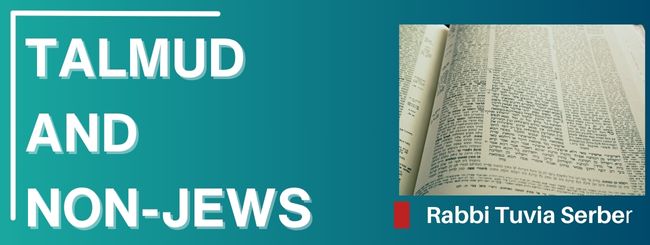בס”ד
.
This is a simplified blog based on a lesson by Rabbi Tuvia Serber. It’s highly recommended to watch the full lesson on YouTube and check the sources below for deeper study and verification.
Rabbi Tuvia Serbers’ class focuses on a part of the Talmud that is often misused by those who dislike Jews to claim that Jews think less of non-Jews. Many of these false claims come from a book by Reverend Pranaitis called The Talmud Unmasked, which takes quotes out of context and twists their meaning.
This blog aims to clarify what the Talmud really says, so you can understand the truth behind the controversy.
Who Is “Adam” According to the Talmud? Understanding What It Really Means
If you’ve ever read about the Talmud, you might have come across a surprising statement: that non-Jews are not called “Adam.” That sounds pretty harsh, right? Like saying non-Jews aren’t human. But is that really what it means? And what does “Adam” actually mean in this context?
Let’s take a calm, careful look at what the Talmud really says, what it means, and why it’s mostly about a very specific legal issue — not about insulting anyone.
A Small Piece of a Very Big Book
The Talmud is one of the most important texts in Judaism. It’s not just a book but a huge collection of writings filled with stories, discussions, laws, and explanations. It can be quite complex because it jumps between topics and sometimes uses words in ways that aren’t obvious at first. Jewish students dedicate themselves to deep study of it throughout their lives.
Sometimes, things in the Talmud sound strange or shocking if you don’t know the full story. One example is in the tractate Yevamot (page 61a), where it says that the grave of a non-Jew does not cause ritual impurity in the same way a Jewish grave does. Why? Because only “Adam” causes ritual impurity, and according to a verse in Ezekiel (34:31):
“You are my sheep, the sheep of my pasture; you are called men (Adam).”
Here, the Talmud understands “Adam” to mean only Jews in this specific legal context.
“Adam” Means More Than Just “Human”
In Hebrew, “Adam” usually means “man” or “human.” But in the Talmud, words sometimes have very precise legal meanings. In this case, it relates to laws about ritual impurity.
A dead Jew causes ritual impurity to others, even if you just walk over the grave. A dead non-Jew does not cause this type of impurity. So, the Talmud says only “Adam” in this sense causes impurity — and here, “Adam” means Jews.
But Doesn’t the Bible Call Everyone “Adam”?
Yes! The Talmud itself asks this question. For example, in the Torah, in Numbers 31:28, it says:
“From the women and children and all the animals, 16,000 souls (nefesh Adam) were captured.”
Those people were Midianites — not Jews — but they’re still called “Adam.”
What’s going on? The Talmud explains that in that verse, “Adam” is used simply to mean “people” (as opposed to animals), not in the special legal sense of ritual impurity.
What Do the Commentators Say?
Rashi, one of the most famous Jewish commentators, explains that “Adam” in this particular legal context only refers to Jews.
But Rabbeinu Tam, Rashi’s grandson, offers a more nuanced view. In Avodah Zarah 3a and Sanhedrin 59a, the Talmud cites Leviticus 18:5:
“You shall therefore keep My statutes and My ordinances, which if the man (haAdam) does, he shall live by them.”
The Talmud notes that it doesn’t say “priests, Levites, or Israelites,” but rather uses the broader term haAdam — “the man.” And the Talmud concludes saying that even a non Jew that learns Torah is considered as a Hight Priest!
Rabbeinu Tam explains that there is a key linguistic distinction: adam (without the definite article) often refers specifically to Jews, while haAdam (with the article) includes all of humanity. This implies that non-Jews, too, are included in this verse and can merit life through the commandments that apply to them.
A Lesson in Humility for Everyone
The founder of Chabad, the Alter Rebbe, quotes an old teaching:
“Be humble before ha’Adam — the human being.”
Originally, the text said “Adam” without the article, meaning “your fellow Jew.” But the Alter Rebbe deliberately says “ha’Adam” to teach that humility is owed to every human being — Jewish or not.
What Really Makes Us Human?
The famous commentator Malbim explains that “Adam” means only humans, never animals or objects.
Anyone who lives with a conscience, who seeks what is right and wrong, deserves to be called “Adam.” Someone who lives without moral awareness might behave like an animal, but that doesn’t mean they stop being human — they just act as if they aren’t.
So What’s the Bottom Line?
The Talmud’s statement that non-Jews are not “Adam” is a very specific legal point about ritual impurity. It doesn’t say they are not human.
In many other places, non-Jews are clearly called “Adam” or “haAdam” — simply people.
Anyone who claims the Talmud says non-Jews are less than human either misunderstands it or twists it maliciously.
In Conclusion
Every person is valuable, can learn and grow, and can connect with G-d in their own way. The Talmud says non-Jews do not have the same ritual status as Jews — but it never says they are not people.
Anyone who says otherwise has simply misread the text.
This blog accompanies the lesson by Rabbi Tuvia Serber. It is highly recommended to watch the full lesson on YouTube.
With thanks to Rabbi Tuvia Serber for giving the lesson and providing feedback on this blog.
More shiurim of Rabbi Tuvia Serber
© Copyright, all rights reserved. If you enjoyed this article, we encourage you to distribute it further.
Our blogs may contain text/quotes/references/links that include copyright material of Mechon-Mamre.org, Aish.com, Sefaria.org, Chabad.org, and/or AskNoah.org, which we use in accordance with their policies.
